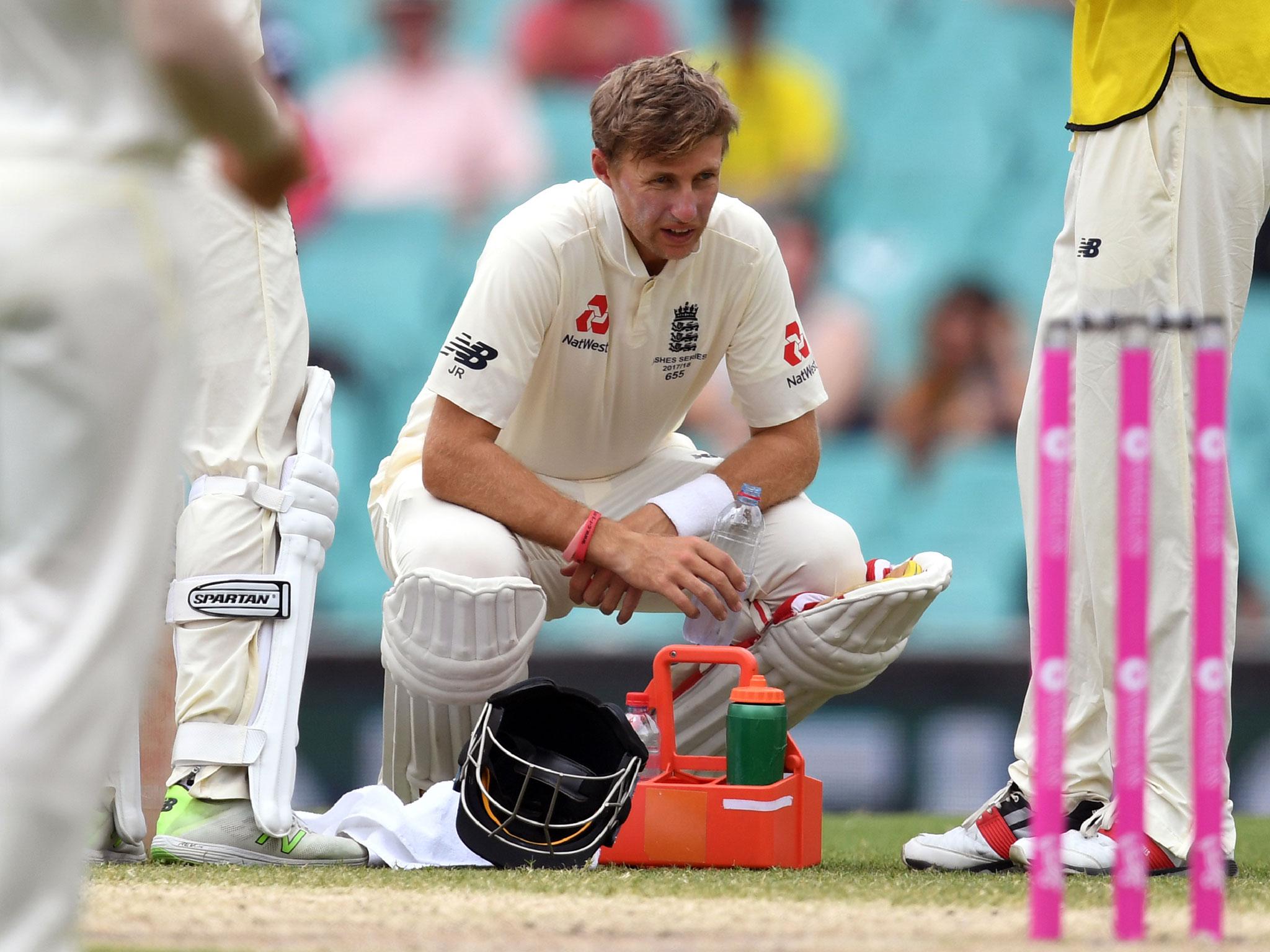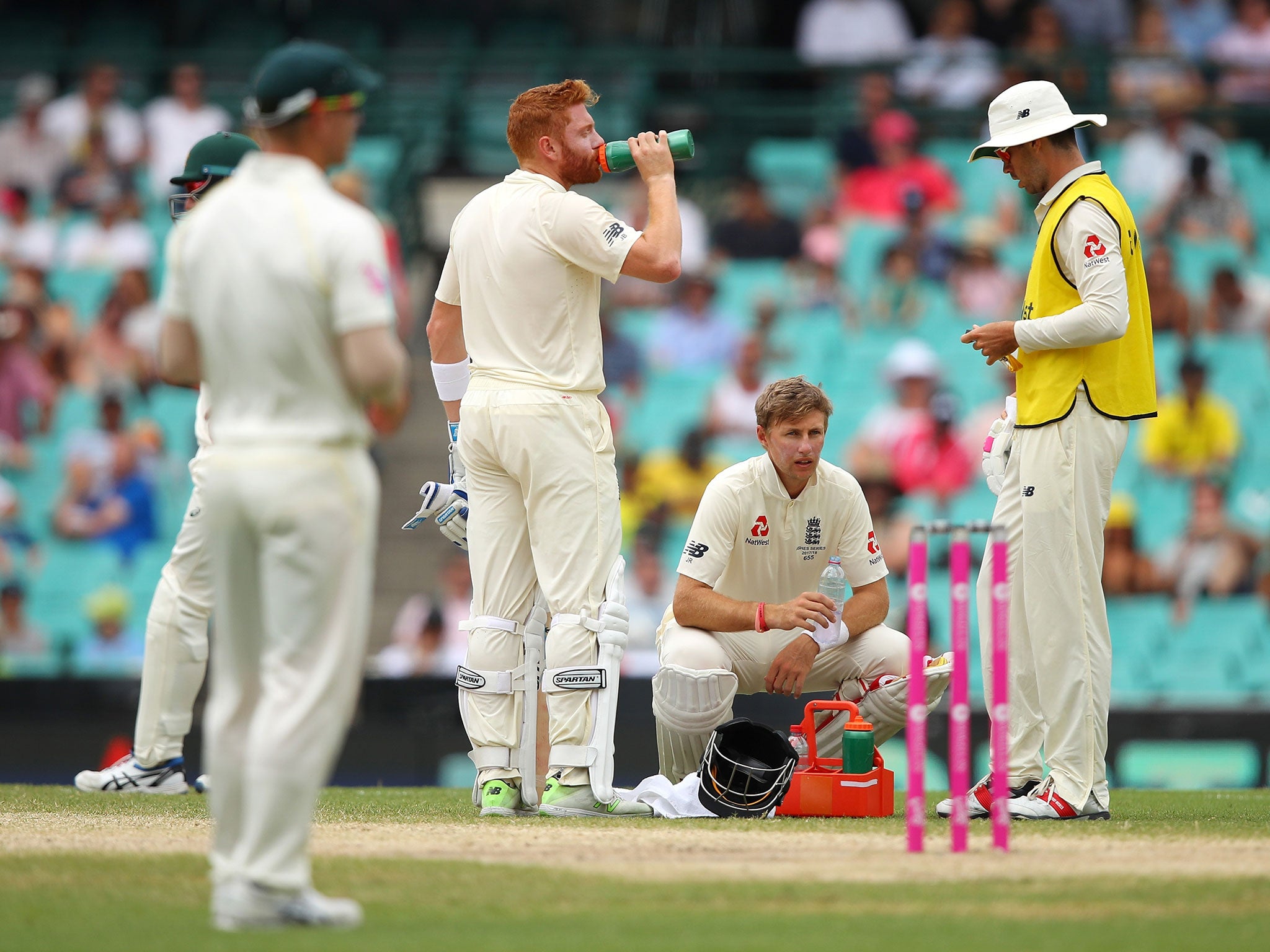ICC criticised for lack of policy on playing in excessive heat after Joe Root is hospitalised in Sydney
Tony Irish, executive chairman of FICA, believes that events at the SCG should be a deafening wake-up call to world cricket’s governing body

Your support helps us to tell the story
From reproductive rights to climate change to Big Tech, The Independent is on the ground when the story is developing. Whether it's investigating the financials of Elon Musk's pro-Trump PAC or producing our latest documentary, 'The A Word', which shines a light on the American women fighting for reproductive rights, we know how important it is to parse out the facts from the messaging.
At such a critical moment in US history, we need reporters on the ground. Your donation allows us to keep sending journalists to speak to both sides of the story.
The Independent is trusted by Americans across the entire political spectrum. And unlike many other quality news outlets, we choose not to lock Americans out of our reporting and analysis with paywalls. We believe quality journalism should be available to everyone, paid for by those who can afford it.
Your support makes all the difference.The head of the Federation of International Cricketers’ Association (FICA) has criticised the lack of a global policy on playing in excessive heat – and believes players’ lives are being put at risk.
His warning comes after England and Australia battled it out in temperatures that hit the mid to high 40s in Sydney on Sunday. A heat-tracker on the edge of the pitch at the SCG registered 57.6 degrees Celsius at one stage as England wilted under the combined weight of Australia’s dominance and some of the most hostile conditions a touring side has ever encountered.
England skipper Joe Root was eventually hospitalised on the morning of day five as a result of severe dehydration.
It was later revealed that he was suffering from a severe gastroenteritis bug.
Tony Irish, executive chairman of FICA, believes that events at the SCG should be a deafening wake-up call to world cricket’s governing body, which has so far stalled in introducing a global health and safety policy for its players.
“There are no globally enforceable health and safety and security standards,” Irish told The Independent. “This (the way excessive heat is managed) should form a huge part of that. It needs to be science based. The ICC have now re-established medical committee so there needs to be policies that are enforceable everywhere. There’s no excuse.
“What will it take – a player to collapse on the field? I don’t know what it’s going to take for the ICC to take action. As a players’ body we want a centralised approach to health and safety and security.
“What happened at the SCG shouldn’t have happened.”
Dean Jones, who was famously put on a drip in hospital after scoring 210 for Australia against India in Madras in 1986, took to Twitter to voice his concern that play was allowed to continue in such extraordinary temperatures.
“After speaking to a couple of doctors this morning….in my opinion cricket should be called off after 41C…it’s a workplace issue now….just my opinion,” he tweeted.
An extra drinks break was introduced at the SCG but in the kind of temperatures seen on Sunday that was little more than a token effort at tackling the heat.
Cricket is certainly way behind tennis, which introduced an extreme heat policy way back in 1998. That policy was updated in 2015 as a result of the Melbourne heatwave the previous year when players expressed concerns over the temperatures they were being forced to play in.
“I was thinking I could even die here,” was the summation of Croatian Ivan Dodig when he retired two hours and 22 minutes through his tie with Damir Dzumhur.

Umpires at this year’s tournament are able to suspend play when the temperature goes above 40 degrees Celsius.
George Havenith, professor of Environmental Physiology and Ergonomics at Loughborough University, says he finds it ‘unbelievable’ that the ICC doesn’t currently have any provision for taking players off when the mercury soars as it did at the SCG.
“I find it staggering that there’s no policy in place,” he said. “The problem is that, maybe it hasn’t happened that often in the past but also, more worryingly, is the fact that there’s a lot of commercial interest in these matches.
“It seems that the commercial interests weigh very heavily. It would be very helpful to have very clear guidelines on what really is the limit that these players should be forced to play in.
“You don’t necessarily have to stop play but you need to consider adding far more regular drinks breaks – that would make a huge difference. Dealing with heat exposure puts individuals under a huge amount of strain.
“It’s a very strange difference in how rigid they are in one area, like taking players off for bad light, and how almost ignorant they are in others. I find it unbelievable.”

England’s assistant coach, Paul Farbrace, was wheeled out at the end of possibly the worst day of the tour – quite some feat – to face the press and said that the players were lucky to follow the sun for 12 months of the year.
As Root proved, though, spending up to six hours in a Sydney furnace can leave you feeling anything but fortunate.
In temperatures not seen for 78 years, Sydney’s residents were advised to ‘re-think their plans’ if they involved any strenuous or sporting activity on Sunday.
That warning didn’t make it as far as the city’s historic cricket ground.
Although the physical loads on cricketers are, in the main, less than those faced in tennis, the impact of extreme heat can be equally as devastating.
“In the past, I think we assumed too easily that the heat is just one of the struggles that these top athletes have to fight,” Havenith said. “If it’s that hot – that’s just tough. But there are limits to these things.
“Cricket, of course, has a lower physical load (than tennis) but you’re still getting into an area where the heat can have a number of effects.
“A tennis player can lose three or four litres in an hour and you can’t replenish all of that because that would upset your stomach. Usually you can only replenish a litre an hour. That’s a big problem.
“In Joe Root’s case, an illness like gastroenteritis would only be exacerbated by this.”
The heat has been on the England skipper since he arrived on Australian soil and it has finally taken its toll. Whether the ICC sit up and take notice is anyone’s guess.
Join our commenting forum
Join thought-provoking conversations, follow other Independent readers and see their replies
Comments